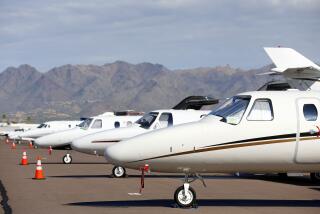Profitable Airlines Pay Taxes on Bailout
- Share via
After securing a highly publicized $5 billion of cash aid as part of their $15-billion bailout, the airlines are now reporting a little-noticed aspect of the rescue package: They have to pay federal taxes on the cash grants.
That means the airlines won’t be getting $5 billion after all, but considerably less, as U.S. taxpayers get back part of the money they’re sending the airlines in the first place.
Southwest Airlines and Alaska Air Group--the first airlines to post their third-quarter results--both reported paying a typical 38% tax rate on their portion of the $5 billion they’ve received so far.
“Oddly enough, the government gives and it takes some of it back,” Gary Kelly, Southwest’s chief financial officer, told analysts during a teleconference last week. “The industry does not get the full $5 billion in grants.”
Kelly’s comments came in response to a question from an analyst, indicating that even some Wall Street airline experts previously weren’t aware the bailout came with a taxable string attached.
Rep. Roy Blunt (R-Mo.), who helped steer the bailout legislation through the House, said through a spokesman that airlines will pay the tax only if they have a profit--and that if they have a profit, they should pay a tax.
But it’s not just the few airlines that are currently profitable, such as Southwest and Alaska Air, that are subject to the tax, airline officials and analysts said. American parent AMR Corp., which announces its third-quarter results today, and other major carriers that are expected to report huge third-quarter losses in the aftermath of the Sept. 11 attacks, also are expected to pay Uncle Sam sooner or later.
Even with their bailout cash, those airlines won’t have profits and thus won’t be paying income taxes for the third quarter. But once the companies regain profitability and again face a tax liability, they can “carry forward” past losses and offset them against their income taxes. But in this case, those losses will be smaller because of the bailout cash.
So, in effect, the airlines “at some point will pay taxes [on the bailout money] one way or the other, assuming they’re profitable again,” says one airline executive, who did not want to be identified since he was speaking about rival carriers.
Airline officials said the $5-billion figure was not front-loaded to cover tax payments.
“We didn’t make the number larger because we thought it would be taxed,” said Joe Kolshak, head of investor relations at Delta Air Lines, whose Chairman Leo Mullin was among the bailout’s architects.
Rather, the $5-billion request was based on the industry’s losses after the attacks, and was submitted to the federal government before the carriers knew for sure the grants would be subject to taxes.
And the industry had initially asked Congress for a $24-billion bailout, which would have included about $7.8 billion in one-year tax relief. But that provision was rejected and the whole rescue bill was reduced to $15 billion, with $5 billion in cash and the remainder in government loan guarantees.
To be sure, the airlines aren’t complaining about the taxes. In the days after Sept. 11--which included a historic two-day shutdown of civilian air travel--the carriers were rapidly running out of cash and needed help immediately.
“We were certainly happy that the government came to our assistance,” Kolshak said. “It wasn’t lost on us that it would be taxed. But these were the terms that we accepted.”
Alaska Air, for example, had net income of $25.3 million in the third quarter, during which the Seattle-based carrier got $29.1 million as the first installment of its bailout money. (Most of the airlines have received about half of the cash they’re allotted. The rest will be dispersed in the coming weeks.) But then the airline had to pay $11.1 million of tax on the cash.
“We weren’t surprised that it is subject to tax,” just as many other types of one-time gains are taxable, said Brad Tilden, Alaska Air’s chief financial officer.
Southwest in the third quarter booked $169 million in cash aid under the bailout, and had to pay $65.2 million in taxes on the gain. “There’s no question that it’s taxable,” said Southwest’s Kelly. Referring to the bailout legislation, he added: “That’s in the act.”
More to Read
Inside the business of entertainment
The Wide Shot brings you news, analysis and insights on everything from streaming wars to production — and what it all means for the future.
You may occasionally receive promotional content from the Los Angeles Times.








